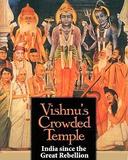Professor Maria Misra
My current research interests lie in the field of gender in a global context, and I am writing a single volume global history of gender. I have also written on many aspects of empire, nationalism and post-colonial identity in India and Britain, including the politic of race and business in the late colonial era, the martial culture of Gandhian nationalism and the place of the Raj in Indian memory
I have recently been awarded the first AHRC Fellowship in Equality, Diversity and Inclusion.
Research Interests
- Gender
- Post-colonialism
- South Asia
I began my research career with a cultural study of the role of race and identity in the relationship between British and Indian businessmen in late colonial India. I have since written a general history of India from the late nineteenth century to the present, and have published articles on several aspects of the cultural and intellectual development of Indian nationalism throughout the twentieth century. I am currently writing a global history of gender, taking a long historical perspective: I am interested synthesising insights from cultural studies, literary approaches and the social sciences to offer an integrated analysis of how gender has evolved over time and space in the long duree, and of the interconnections between colonial, colonised and post-colonial perspectives in shaping current debates and controversies over the global gender order.
Featured Publication
Guardian Review: https://www.theguardian.com/books/2007/aug/12/historybooks.features
Independent Review: http://www.independent.co.uk/arts-entertainment/books/reviews/vishnus-crowded-temple-by-maria-misra-462729.html
Telegraph Review: http://www.telegraph.co.uk/culture/books/non_fictionreviews/3668012/A-modern-history-of-India.html
In the Media
An Indian Affair
Is the Mau Mau settlement a good thing for the UK?
Teaching
I would like to hear from potential DPhil students regarding in all aspects of South Asian history (though especially intellectual and cultural history) of the C19 and C20; also topics in global history, especially gender and the history of ideas
I currently teach:
| Prelims: | FHS: |
| Approaches to History |
General History XVIII: Global & Imperial, 1750-1914 |
| History of the British Isles VII, 1924-present | |
| Further Subject, ‘Postcolonial Historiography: Writing the Indian Nation’ | |
| Special Subject: ‘From Gandhi to the Green Revolution: India, Independence and Modernity’ | |
| Disciplines of History |





